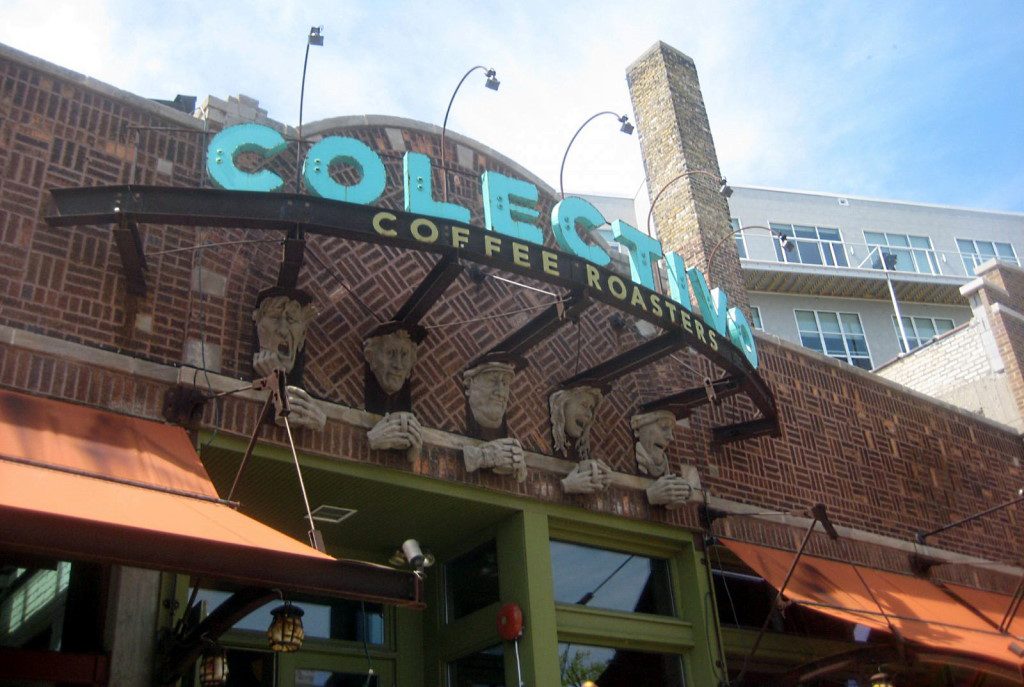Union Bid At Colectivo Still On Hold
Workers approved union but owners using legal appeals to stall federal certification.
On a warm late day in late August, pro-union employees of Colectivo Coffee celebrated when a long-delayed count showed they’d won their union representation election.
Four months later, they’re still waiting for the National Labor Relations Board (NLRB) to certify the outcome so they and their union, the International Brotherhood of Electrical Workers (IBEW), can start negotiating a first contract with the Milwaukee-based coffee and restaurant chain.
In the aftermath of the final vote count in August, Colectivo’s owners said in an open letter to customers that they were “disappointed” with the results, but added: “We will, of course, respect the rules and bargain in good faith.”
Rather than bargaining, however, Colectivo pressed on with objections in an attempt to reverse the outcome of the vote. So far, those objections have failed, but the legal process is still underway.
“It is important to note that the NLRB process has not been completed and the Union has not been certified,” the company said in a statement issued Dec. 9. “If the International Brotherhood of Electrical Workers is certified as the bargaining representative of Colectivo’s co-workers, Colectivo will bargain in good faith with the Union.”
Beyond the statement, Colectivo’s owners and top management declined to be interviewed.
For workers active in the campaign for a union, however, the delay has been frustrating. “It just seems like Colectivo is doing their best to delay as much as they can because they have nothing,” says Ryan Coffel, a Colectivo shift leader in Chicago.
The Colectivo union organizing drive is one of the largest in Wisconsin in recent memory. It stood out as an attempt to organize in the service sector, which accounts for a growing share of jobs and which was particularly buffeted by the COVID-19 pandemic.
Last week, employees at a Starbucks in Buffalo, N.Y., voted to unionize in a campaign that has been closely watched nationwide and included three locations in the upstate New York community. The outcome was uncertain at another Starbucks, while workers at a third location voted against unionizing.
Unlike those organizing drives — which treated each individual Starbucks location as a separate unit — the Colectivo campaign covered the chain’s entire two-state operation, with more than 300 employees in Chicago and Madison as well as the company’s home city of Milwaukee.
The campaign drew additional attention because employees chose to affiliate with IBEW. While the union’s base is electricians in the construction industry and electric utilities, like many unions it has diversified its membership, with lawyers, museum workers and nursing home employees, among others.
Public backlash
The Colectivo union campaign launched during the pandemic, but union organizers say it had its roots in problems that predated COVID-19. Concerns ranged from lack of follow-through on employee reviews and associated pay raises to equipment maintenance in the production arm of the business, which includes roasting and packaging coffee for on-premise sales as well as shipping directly to customers.
With the widespread shutdown of businesses in the early weeks after the coronavirus began spreading, some hospitality businesses gave workers a couple of weeks of paid time off. Colectivo employees say they didn’t get that until they started an online petition, however, and production employees still didn’t get time off even as workers in the coffee shops did.
Colectivo has long cultivated a progressive brand, even down to the moniker the company adopted when it changed its name from Alterra Coffee. Workers hoped that might make the company receptive to their desire for union representation and a voice in their workplace.
Reports that Labor Relations Inc. and its affiliate, LRI Consulting Services, are required to file with the federal government show that the firm collected at least $103,000 from Colectivo in 2020, billing up to $375 an hour. The firm’s 2021 report isn’t due until early next year.
In two essentially identical letters to Colectivo executives, Phillip B. Wilson, the president of Labor Relations Inc. and LRI, wrote that unions “are desperately trying to attract new members and because so few people have any experience with unions today it is very easy for employees to be misled by a union sales pitch.” Wilson said his firm would “provide your team with access to a subject matter expert who can help answer questions and dispel common misconceptions about how unions work in real life.”
Colectivo’s own direct campaign to defeat the union included protestations that unionizing would be divisive along with messages of contrition. Both are staples of employer campaigns to defeat organizing drives, according to union organizers and academic experts who have studied union elections.
“We have heard the call for accountability,” stated one missive to employees in February 2021 from Colectivo’s owners, one month before voting started in the union representation election. The letter promised a new human resources “strategy” with “a focus on training and development, diversity and inclusion and increased communication.”
When the NLRB counted the mail-in ballots in the representation election in April 2021, the first batch resulted in a tie of 99 votes for the union and 99 against. Ballots of 16 additional voters were left unopened because of challenges to their eligibility, primarily by Colectivo. The regional director for the NLRB’s Minneapolis office, which includes Wisconsin, subsequently ruled seven of those ballots were eligible to be counted. They were opened, and all favored the IBEW, which prevailed 106-99.
The company appeals
Instead of the quick NLRB certification that Colectivo’s pro-union employees had hoped for, however, the company pursued objections that it had filed in April after the original vote count. After the final tally in August, the NLRB regional director, Jennifer Hadsall, ordered a hearing on those objections, which took place Sept. 29.
The objections revolved around the company’s claims that some mail-in ballots were handled improperly by pro-union employees — claims that “we knew pretty quickly were completely fabricated,” says Hillary Laskonis, another organizing drive leader. On Nov. 9, an NLRB hearing officer, Jessica Cholewa, issued a report finding “no evidence” for any of the company complaints. She recommended overruling the objections “in their entirety.”
Drawn-out appeals in organizing drives have long irked union supporters, who are inclined to believe that employers simply use the process cynically to thwart unionization even when a majority of workers support it.
“Often the delays are very effective, because employees just get tired or fed up,” says James Gross of the Cornell University Industrial and Labor Relations School and a historian of U.S. labor law. “[Some] of those challenges are just a deliberate tactic of delay to discourage and undermine the union.”
But Gross, who emphasizes he hasn’t followed the Colectivo case and is not passing judgment on either side in the dispute, also observes that “one party’s delay is another party’s due process” — which would be lost if appeals were simply abolished.
“Ultimately what so much of this comes down to is power,” Gross says. “But it’s also good faith. Bad faith can exploit procedures that were designed to protect one group of people” — employers, for example — “in ways that destroy the rights of other people.”
Silence from the top
Colectivo union activists say that since the final vote count, company management has all but clammed up — in sharp contrast to weekly or more frequent communications to employees in the months before the union vote.
“There has been kind of a silence from management for the most part,” says Laskonis. “The things they said they would implement haven’t been implemented. The company made promises about better systems for feedback from workers and listening to the concerns that folks who were organizing the union said that they had — it’s just been incredible how little they’ve done.”
For Ida Lucchese, that has just reinforced the value of a union contract. “I’ve realized anything can be said, but unless it’s in a legal agreement, it’s not necessarily going to happen,” Lucchese says.
Café workers got a $1 raise earlier this year, but that doesn’t appear to have been extended to other parts of the business, Laskonis says. “Now we’re hearing from workers that they’re being told they can’t give anyone a raise, and that they’re being told it’s because of the union,” she adds. “Workers are coming up to me, saying, ‘When is this thing going to go through?’”
“All we want from them is to keep their word from that open letter to customers [after the final vote count] that they would accept the results and bargain in good faith,” Coffel says.
As Colectivo has revved back up from the pandemic shutdown, there have been many new employees. Some were unaware of the very public union campaign. At the same time, “we’ve had a lot of new hires who applied to Colectivo because they knew that we were unionizing,” Laskonis says. “That’s really given us a lot of steam.”
Union organizers are working to engage fellow employees to learn their evolving concerns and priorities for a union contract.
They’re also trying to make the best of the current sense of limbo, using “this in-between time to build strong connections between workers,” says Lucchese. “It’s not been a bad thing for community organizing to have more time to build those connections.”
When Laskonis went to work for Colectivo, she was enthusiastic about her new employer and the values that it professed. She sees a union as an opportunity for “making it more authentic.”
But she also has come to view the business from a more guarded perspective. Especially when she is at her job in the café, the same building that houses top managers in the company.
“I pass a mural of the Dalai Lama every day, leading up to their offices,” Laskonis says. “Since March, it’s becoming more and more difficult not to stand there and start asking people — do they know who this guy is?”
Months after union workers won at Colectivo, they’re still on hold was originally published by the Wisconsin Examiner.
More about the Union Effort at Colectivo
- NLRB Upholds Colectivo Union Election - Graham Kilmer - Mar 25th, 2022
- IBEW Local 494 Celebrates the Final Decision of the National Labor Relations Board (NLRB) on the Colectivo Coffee Workers Successful Unionization Campaign Effort - International Brotherhood of Electrical Workers Local 494 - Mar 25th, 2022
- Union Blasts Colectivo For Stalling Negotiations - Graham Kilmer - Jan 6th, 2022
- Union Bid At Colectivo Still On Hold - Erik Gunn - Dec 13th, 2021
- County Board of Supervisors Congratulate Colectivo Workers on Successful Union Election - Milwaukee County Board of Supervisors - Aug 27th, 2021
- Supervisor Czarnezki Calls on Colectivo Ownership to Bargain with Employees in Good Faith - Sup. Joe Czarnezki - Aug 27th, 2021
- Congratulations Colectivo workers - Milwaukee Common Council - Aug 25th, 2021
- Colectivo Workers Win Union Election - Graham Kilmer - Aug 23rd, 2021
- Colectivo Union Election Is a Tie Vote - Graham Kilmer - Apr 6th, 2021
- Colectivo Union Election Finishes - Graham Kilmer - Mar 31st, 2021
Read more about Union Effort at Colectivo here























Colectivo owners are pigs, they have the right to shut up and let the employees unionize.
“Hipster capitalism” is, in the end, still capitalism. Colectivo management is no different than Amazon or Kellogg. Drinking’ my coffee elsewhere til they settle a contract.
I don’t care how good the frozen mocha is, I’ll gladly go without until Colectivo unionizes.